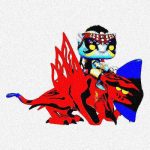(He rescatado y expandido esto de un hilo de twitter que borré haciendo purga de la cuenta por si acaso se va todo al traste por culpa del Melon Tusk.)
Hace unos meses tuve un sueño lúcido o vívido, en el que un profesor de universidad que tuve daba una clase a la que decidí ir de oyente. Paraba la clase varias veces para señalarme, mofarse e invitarme a marcharme por no estar a la altura, como en Whiplash pero sin llegar a revolear sillas. El tipo decía frases como “Recordemos que fuiste de los que peor se te daba resolver los problemas en X asignatura, así que, que haces aquí?” o “ Espero que no tenga que explicar las cosas de manera más fácil para Alberto, no voy a permitir que por culpa de alguien que no siga el ritmo todos mis alumnos se queden sin transformarse en auténticos profesionales de su hobby”.
Lo curioso es que en el sueño yo ya había defendido la tesis y estaba haciendo el postdoc, como ahora. O sea, que estaba siendo juzgado en un entorno de grado universitario, como si mi corta experiencia no valiese de nada. Como si yo no valiese nada. No me enteré de nada de la clase, lloré en silencio aguantándole la mirada y sentí que la frustración me paralizaba, pero no me marché de la clase. Aunque me sentí fuera de lugar, rechazado y humillado, no me marché porque 1) no iba a entrar al juego, 2) por demostrar que no se me doblega a base de esa actitud, y 3) porque irme hubiese significado defender la barrera elitista en la ciencia y estoy totalmente en contra de eso.
Cuando me desperté yo entendí que todo esto refleja miedos profundos de no encajar en la ciencia como profesión, de no estar al nivel de rigor que se exige para ser un buen científico. Y también un miedo a que la gente que me importa guarde un juicio de mí tan distinto del mío hacia ellos. Y supongo que también conecta con el miedo a sentir que no se pudiere comprender una situación como la mía de carrera corta (aunque sé que no es algo único, y trabajo constantemente en dejar de hablar de ello o de traerlo a la conversación, porque el tiempo va pasando y mi situación se va normalizando poco a poco).
Otra cosa que me impactó y a la que le estuve dando vueltas fue mi reacción dentro del sueño. Como decía arriba, fue un sueño vívido y tenía una sensación enorme de certeza de que aquello era real. Y a pesar del posible miedo que tuviese, me enorgulleció mi reacción de mantenerme firme y no entrar al juego. No iba a esconder que eran unas palabras hirientes, y que me afectaban, pero me aseguré de marcar una diferencia entre cómo me hacía sentir y cómo reaccionaba ante ese dolor. Todavía creo que fue lo mejor que pude hacer.
En fin, el poder de la mente. Lo bueno es que 1) fue un sueño, 2) ayuda a identificar raíces de los miedos, 3) muchas otras experiencias reales dicen lo contrario de lo que se propuso aquel profesor en mi sueño. Como leí una vez, no hay peor tormenta que la que se monta uno solito en la cabeza.


